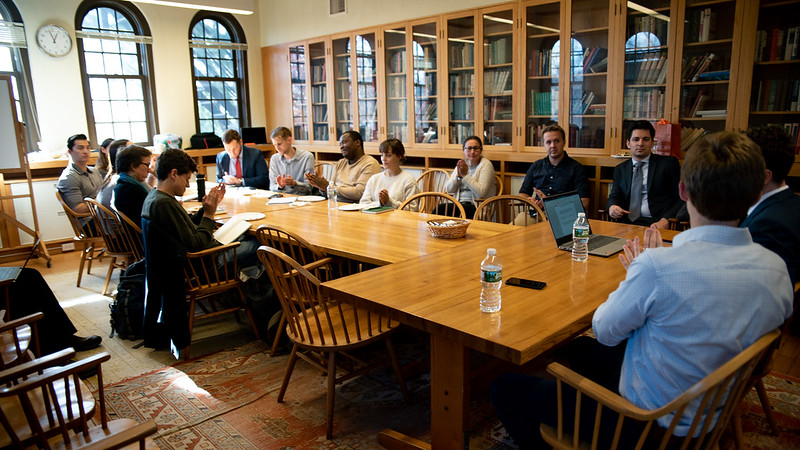Capstone Projects
All Fletcher master’s students must complete a capstone project. The capstone project must evidence scholarly and/or professional analysis informed by the sustained and appropriate application of analytical methodologies. The capstone project is a significant analytical piece of work: it represents work of a higher standard than what is normally expected of a term paper and provides an opportunity for students to draw on their methodological, analytical, and substantive learning in a comprehensive written study. Learn more about capstone projects here.
Please see examples of previous capstone projects on Russia and Eurasia below:
A Cleaner Great Game? Russia and China’s Challenges with Electric Vehicle Battery Materials in Central Asian Countries of the Former Soviet Union. (Terrence Cronin, 2023)
Investigating the Supply and Demand of Climate Disinformation: The Role of Propaganda, Ecosystem Amplification, and Social Media in Russia and the U.S. (Vishal Manve, 2023)
Dawn of Digital Age: Tracing the Roots of Russian Intelligence Activities in Cyberspace (Jesse Nurse Yaker, 2023)
Ploughshares to Swords – The Political Economy of Weapons of Production at Veb Carl Zeiss Jena, 1976-1989 (Luke Moderhack, 2023)
Remedial Secession as Soft Law: The Case Study of Artsakh’s Self-Determination (Alex Avaneszadeh, 2023)
Compliance Revisited: Great Powers and International Law on the Use of Armed Force Since 2001 (Ananmay Agarwal, 2022)
Kalibr Production and Russia’s Non-Nuclear Deterrent (Andre Gellerman, 2022)
High-Tech Import Shortages: The Aftermath of Sanctions in the Russian Shipbuilding Industry (Maxim Kondratenko, 2022)
Weaponizing Language Politics: Russian Foreign Policy Motives From 2014-Present(Anastasia D. Kukunova, 2022)
Russo-Georgian Relations: Measures Georgian State Can Undertake to Counter External Threats Stemming from the Russian Federation(Salome Chokheli, 2021)
Russian Nuclear Power in Turkey: Energy Cooperation in a Strategic and Trade Environment(Marina Lorenzini, 2021)
Russian Humanitarian and Cultural Presence in the Western Balkans in the Last Decade: Cases of Slovenia, Croatia and Serbia(Natalia Yakimchuk, 2021)
Sanctions vs Strategy: a Sectoral Case Study of Russia’s Sanctions Response Strategies for Preserving the Status Quo(Parv Aggarwal, 2020)
Elite Defection in Ukraine in 2013-2014: Is Pluralism the Reason? (Lisa May, 2020)
Hidden Gems: The Race For Rare Earth Metals In Greenland: Soft Power Competition in an Opening Arctic (Gauri Gupta, 2020)
China-Russia 2030: Entangled Futures(Max Loebl, 2020)
Global Governance of Autonomous Weapon Systems: The Russia Case Study (Matthew Kokkinos, 2020)
The United States, American Exceptionalism, and UNCLOS: Paradox in the Persian Gulf, Patterns in the Pacific, and the Polar Vortex(Mia Adamowsky, 2019)
Attraction Underminded: Examining Russian Soft Power and Levers of Influence in Ukraine (Markian Kuzmowycz, 2019)
Khrushchev in the Cornfields: How an Iowa Corn Farmer Befriended the Soviet Premier, Modernized Russian Agriculture, and Warmed the Cold War (Jacob Hill, 2019)
The Unraveling of the Intermediate-Range Nuclear Forces Treaty: Geopolitical Implications for the North Atlantic Treaty Organization, United States, and Russia (Grace Kang, 2019)
Medium- & Long-term Prospects for Advancing US Georgia Security Cooperation (Zviad Adzinbaia, 2018)
Deliberate Warfare: Destruction of Cultural Property During Armed Conflict in Bosnia & Armenia (Mariya Ilyas, 2018)
The Baltic Centre For Media Excellence: a Case Study On Media Literacy As a Tool Against Russian Disinformation (Cynthia Garcia, 2018)
Russian Foreign Policy and Putin’s Fear of Revolution (Speed Elliott Estebo, 2015)
How to Create Efficient, Reliable and Clean Electricity Markets: A Regulatory Design for Mongolia and Northeast Asia (Paul G. Maidowski, 2012)
The Socialist Construction of the Moscow Theater Festival 1933-1937 (Michael Leonard Kersey Morris, 2012)
The Southern Energy Corridor. Competition and Cooperation for Natural Gas Transportation in the Black Sea and Caspian Region (Liam P. Hardy, 2012)
The Dawn of a New Arctic Chessboard (Elizabeth Deheza, 2010)
Azerbaijan and Israel. Oil Islam and Strawberries: Pragmatism in Foreign Policy Between Unlikely Allies (Robert Marcus, 2009)
Prospect of Energy Link Between Central Asia and China. A Study on the Development of “Energy Silk Route,” the Turkmenistan-China Pipeline (Masato Kamiya, 2009)
Geopolitics of Energy in the Caspian Sea Region. Azerbaijan’s Challenges (Ilgar Mammadov, 2009)
Media Independence. Variables Affecting Freedom of the Press: Cross-Country Regression Analysis with Implications on Russian Media (Armine Simonyan, 2007)
Towards a New Model of Cooperative Development. Enhancing and Leveraging the Benefits of FDI for Emerging Economies (Sylvia Ciesluk, 2007)
Oil, Democracy and the Globalization of the Nagorno Karabakh Conflict (Hilary Sienrukos, 2007)
Time to Restructure the Ukrainian National Association. Here’s Why and How (Damian Olesnycky, 2007)
Terror-Crime Nexus. Terrorism and Arms, Drug, and Human Trafficking in Georgia (Colleen Traughber, 2007)
Conflict Sensitive Development–Reality or Wishful Thinking? (Marine Pevzner, 2006)
Misreading Moscow: Toward a New Interpretation of Russian Peacekeeping in the Early 1990s (Kristina Jeffers Thesis, 2006)
The Invisible Enemy: Suicide Terrorism in Chechnya and Sri Lanka (Jillian Manekas, 2006)
Strengthening the Nuclear Biological and Chemical Weapons Nonproliferation Regimes (Devin D. Jessee, 2005)
Emergence of New Political Identity in the South Caucasus. Energy, Security, Strategic Location and Pragmatism (Elin Suleymanov, 2004)
The Forty Year Crisis: Berlin (1948-1989) (Daniele Cosson-Schere, 2001)

